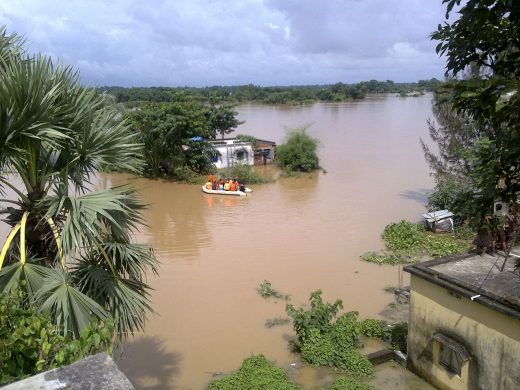International Organization for Migration (IOM) publicerer et stort “atlas” om klimaflygtninge, eller “environmental migration” (miljømæssig migration), som de selv kalder det.
Klimaflygtninge anerkendes ikke af FN, da flygtningekonventioner kræver, at der er tale om en eller anden form for forfølgelse. Alligevel bliver der allerede nu talt om at mennesker må forlade deres hjem på grund af klimaforandringer eller miljøforringelser.
Mange eksperter spår, at klimaforandringer vil spille en stor rolle i fremtidens flygtningestrømme.
Her er en artikel om klimaflygtninge og IOM fra COP21 i december:
http://globalnyt.dk/content/klimaforandringer-og-en-ny-aera-af-fordrevne-uden-fortilfaelde
IOM har arbejdet intenst med problematikken på flere store FN-konferencer, og nu udgiver man dette atlas.
I første omgang er der tale om en publikation på fransk, men den engelske udgave bliver udgivet i juni.
Foreløbigt kan man læse IOM’s pressemeddelelse her:
France – IOM and the Paris Institute of Political Studies (Sciences Po Paris) have launched the French edition of the Atlas of Environmental Migration.
The publication, for the first time, brings together existing knowledge, research and country-level case studies exploring the links between migration, environment and climate change.
Compiled with the help of numerous experts from the academic and institutional sectors from around the world, the Atlas addresses key topics such as the state of research, the complexity of the links between migration and environmental change, key environmental drivers of migration, including climate change, and associated mobility trends.
The publication also focuses on key challenges and opportunities for the affected populations and for policy making, existing governance mechanisms and gaps, good policy practices to address environmental migration, as well as a number of cross-cutting topics including gender, health, and human rights.
Raising awareness
Writing in the publication’s foreword, IOM Director General William Lacy Swing said:
“The Atlas of Environmental Migration is the reflection of our commitment to contribute to raising awareness of the importance of the impacts of climate change on human mobility; and also to encouraging organized and effective responses to the challenges posed by this kind of migration.”
“The Atlas of Environmental Migration will help us collectively to look differently at the situation of those who have no other choice but to leave the land where they were born,” added Nicolas Hulot, Special Envoy of the French President for the Protection of the Planet (2013-2016), and founder of the Fondation Nicolas Hulot pour la Nature et l'Homme.
The publication is being launched at a time when migration and environmental change have become two of the most pressing concerns of this century and it is therefore essential that decision makers and the wider public have an improved understanding of the links between these phenomena and of ways to address them.
More than 100 maps, diagrams and infographic
With more than 100 maps, diagrams and infographics, the Atlas of Environmental Migration is the first publication to present research on environmental migration in a visual and highly accessible way, and is intended to become a helpful reference tool for policy makers and executives, researchers and practitioners, higher education institutions and students, and anyone seeking to better understand the issues at stake.
Authored by Dina Ionesco, Head of Migration, Environment and Climate Change Division at IOM, Daria Mokhnacheva, Migration, Environment and Climate Change Specialist at IOM and François Gemenne, Executive Director of the Politics of the Earth Programme at Sciences Po/Medialab, and Senior Research Associate at the University of Liège and the University of Versailles Saint-Quentin-en-Yvelines, the Atlas is the product of a three-year long collaboration between IOM, the Paris Institute of Political Studies (Sciences Po Paris) and the University of Versailles Saint-Quentin-en-Yvelines.
The project benefited from the support of many funding partners, including the Bernheim Foundation, COST Action IS1101 of the European Union, EPA Ghana, the European Commission, the Foundation for Population, Migration, Environment (BMU-PME), the Heinrich Böll Foundation – European Union, the ISDT Wernaers Fund, the Italian Cooperation, the Nippon Foundation, the Secretariat of the United Nations Convention to Combat Desertification, and the United Nations Development Programme.
The English version of the Atlas will be launched in June 2016.
The French version was released in bookshops on 17 March 2016.















